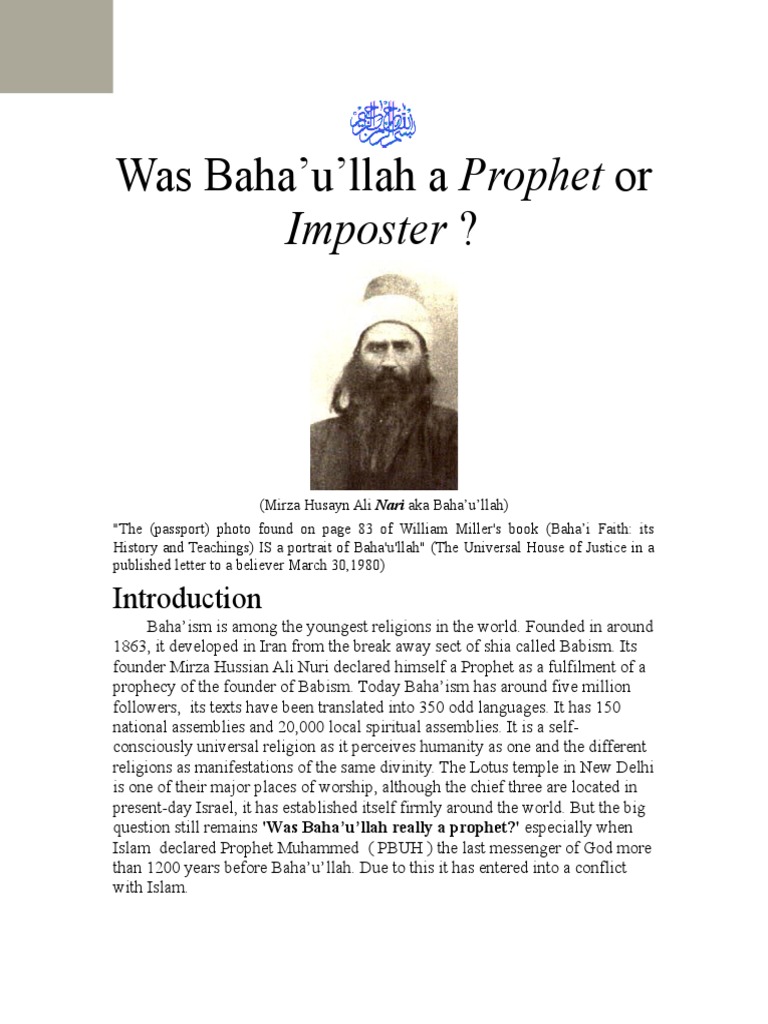In the vast expanse of world religions, the Bahá’í Faith emerges as a unique paradigm, celebrating the unifying essence of spiritual understanding and divine revelation. Central to this faith is the figure of Bahá’u’lláh, revered by adherents as the latest Messenger of God. Accepting Bahá’u’lláh as such carries profound implications, intricately interwoven with themes of identity, purpose, and collective humanity. This exploration delves into the multifaceted dimensions encapsulated in this acceptance, illuminating the theological, ethical, and social ramifications inherent in Bahá’í teachings.
The journey of understanding Bahá’u’lláh as a Messenger of God commences with an examination of His identity. Born in Persia in 1817, Bahá’u’lláh’s life was marked by trials and tribulations. His claim to prophethood and divine mission emerged amid social upheaval and religious rigidities, bringing forth a fundamental question: what distinguishes Him from other historical religious figures? Bahá’í teachings assert that, akin to Jesus, Muhammad, and other prophetic figures, Bahá’u’lláh embodies a divine revelation tailored to the needs of the present age. Thus, acceptance of Bahá’u’lláh necessitates recognizing His unique role in the ongoing evolution of spiritual understanding.
A pivotal aspect of this acceptance is the acknowledgment of the principle of progressive revelation. This doctrine posits that divine guidance is bestowed on humanity through a succession of Messengers, each building upon the teachings of their predecessors while addressing contemporary societal exigencies. Consequently, Bahá’u’lláh’s teachings are seen as both a culmination and a continuation of this divine narrative. For adherents, accepting Bahá’u’lláh is tantamount to embracing the progressive nature of spirituality, which encourages openness and adaptability in the quest for truth.
The implications extend beyond theological nuances to ethical conduct and personal transformation. Bahá’í teachings emphasize principles such as unity, justice, and equity—ideals ingrained in the recognition of Bahá’u’lláh’s message. Acceptance calls upon followers to embody these virtues within their daily lives, fostering a global community characterized by compassion and understanding. The ethical framework laid down by Bahá’u’lláh seeks to transcend divisive barriers, advocating for the oneness of humanity, where distinctions of race, nationality, and class are rendered irrelevant.
Moreover, accepting Bahá’u’lláh as a Messenger of God entails a commitment to social action and the betterment of society. Bahá’í teachings assert that individual transformation must parallel collective progress. Followers are encouraged to engage in service to their communities, championing initiatives aimed at eradicating poverty, promoting gender equality, and furthering education. This intersection of personal faith and social responsibility exemplifies the holistic approach championed by Bahá’í principles. Together, these efforts reflect a deeper understanding of the interconnectedness of humanity.
The spiritual journey towards recognizing Bahá’u’lláh also involves engaging in prayer and meditation. Through these acts, adherents cultivate a personal relationship with the divine, thereby enhancing their understanding of His teachings. The importance placed on spiritual exercises as pathways to enlightenment underscores the dynamic nature of faith within the Bahá’í framework. Acceptance of Bahá’u’lláh is not solely an intellectual assent; it is a transformative experience that reshapes one’s understanding of existence and purpose.
Additionally, the Bahá’í teachings introduce the concept of the Covenant—an essential aspect of accepting Bahá’u’lláh’s role within the divine framework. The Covenant serves as a guardian of the teachings and principles established by Bahá’u’lláh, ensuring that they remain intact and applicable through successive generations. Understanding this Covenant is crucial for followers, as it reinforces a sense of continuity and stability within the evolving landscape of human spirituality. It further emphasizes the importance of unity within the Bahá’í community, where adherence to the teachings and the authority vested in the central figures is paramount.
Toward the attainment of a global civilization, Bahá’í teachings advocate for the establishment of peace and harmony among nations. Accepting Bahá’u’lláh also means engaging in dialogue and fostering relationships across cultural and national boundaries. The emphasis on world peace is not mere rhetoric; it is a compelling call to action rooted in the belief that humanity is one, and that our collective destiny is intertwined. The Bahá’í Faith endeavors to be a beacon for those seeking pathways to a more peaceful and just world.
Ultimately, the acceptance of Bahá’u’lláh as a Messenger of God transcends personal belief; it catalyzes a collective awakening to a broader, shared destiny. It invites individuals to move beyond self-centered existence and to engage profoundly with the world around them. This path, though challenging, offers profound rewards. For adherents, it becomes both a spiritual journey and a commitment to fostering an inclusive and harmonious global society.
In sum, recognizing Bahá’u’lláh as a Messenger of God encapsulates a rich tapestry of theological understanding, ethical commitment, and social responsibility. The implications are far-reaching, inviting both personal transformation and collective action geared towards the unity and betterment of humanity. This acceptance fosters a deeper engagement with the essence of human existence, emphasizing the significance of compassion, justice, and the intrinsic interconnectedness of all people. It is a call to embrace the divine potential within each individual, illuminating the shared path we traverse as members of the human family.
